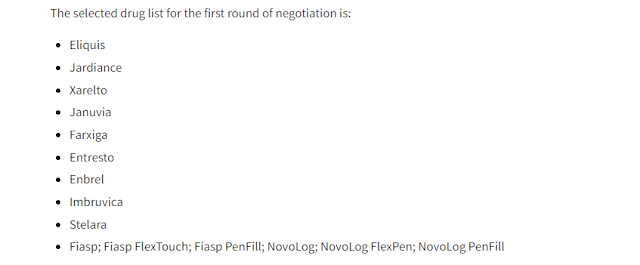I suspect this is one of the reasons why my work was so slow this summer - at least partly because they were waiting on the first round of drugs to be renegotiated in price by Medicare (to limit out-of-pocket costs to patients).
Because what would be the sense of wildly speculating on price, and insurance-company responses to price, in marketing interviews,only to have to reverse it all when this list came out, right?
Well, the first round is here, just announced today - and all 10 drugs have been out on the market for 10 to 20 years, but never came down in price, despite competition.
Why doesn't price erosion happen in pharmaceuticals with more competition, just like in other business?
Because of varying and increasingly steep rebates (essentially kickbacks) offered to PBMs and insurance companies offered in their contracts ;)
Regardless, here are the 10 drugs in the first round of the IRA negotiations.
They are mostly the "novel" type of blood thinners and anti-diabetes meds - literally, lifesaving drugs (with just a few autoimmune disorder drugs sprinkled in).
So what does this mean?
It means that Medicare will renegotiate the price of these drugs to a point that patients will no longer pay more than around $50 per month for these lifesaving drugs.
As a result, commercial insurance will follow suit - not only do they have to already in some ways due to federal mandates, but because why should they now pay literally thousands more for prescription drugs than Medicare for drugs, right?
This is NOT government price control - this is the fact that government insurance is running out of funding and simply cannot afford astronomically high prices anymore - especially compared to what Big Pharma charges other countries - PLUS - senior patients on fixed incomes cannot afford the out-of-pocket copay for these lifesaving meds.
Basically, the government is now saying to Big Pharma and Private Insurance, "Look, we gave you ample time for market competition to work this out, but it didn't because of your large rebates to PBMs and insurance companies that never "trickled down" on the members. Now, we're literally running out of money, going to go bankrupt by 2030, at this rate, and seniors cannot afford the copay for these life-saving meds. You charge other countries a fraction of what you charge us and you know it. So so we don't care how you do it, but American citizens will no longer be paying more than X dollars out of pocket for their meds."
As an aside, after Mark's stroke in 2017, he was initially put on Eliquis. It was $300 a month out of pocket for us, AFTER commercial insurance. They gave us a coupon for $100 off, big whoop.
However, I noted that the cardiologist that "plugged the hole" (his stroke was caused by a PFO or "hole" in his heart, causing blood to not be filtered properly through the lungs, and thus onto the brain) was apparently unaware that Mark had an active bleed from a kidney stone going on at the exact same time, which is the reason he wasn't put on tPA when first arriving to the hospital, by the neurologist.
(Go me, that was a pretty good catch, if I do say so myself - not gonna have my husband now bleed out after all that, right?)
So the cardiologist switched him to Pradaxa, which is less potent than either Eliquis or Xarelto, easier to reverse, and cheaper.
I think we paid about $100 a month for six months (after which he was put on regular aspirin).
So this is a GOOD thing for patients - but a nightmare for insurance companies and Big Pharma.
I can tell you for certain, as a result of transcribing these interviews, the first thing that will happen is Big Pharma is not going to drop the price as much as insurance companies are just going to tighten the belt on restrictions on other drug classes, so as to offset the rebate dollars they're losing from Big Pharma for the drugs on the list ;)
For example, let's just say you want Humira for rheumatoid arthritis?
(***I'm just using Humira as a made-up example, I'm NOT saying this IS going to happen with that particular drug, you understand***.)
Well, you may have to step through more meds for longer first - steroids, immunosuppressants, and any number of other things before you can have it now.
Because Humira is not a lifesaving drug, it's pretty expensive still, even though generics just hit the market, so if you want it now, you're going to have to jump through several more hoops to get it.
Again, just using Humira as example, that is not necessarily going to happen with that particular drug, but it WILL happen in other classes as a way to tighten the belt, rest assured.
However, Humira is expensive and many speculated it would be on this first round - but I think the reason it isn't is because generic adalimumabs just came out and they wanted to see if competition took care of price erosion or not first?
(I doubt it - the generics aren't much cheaper, so we may see Humira and its generics in one of the later rounds ;)
Regardless, more are coming, this is just the first list/round :)

No comments:
Post a Comment
Note: Only a member of this blog may post a comment.